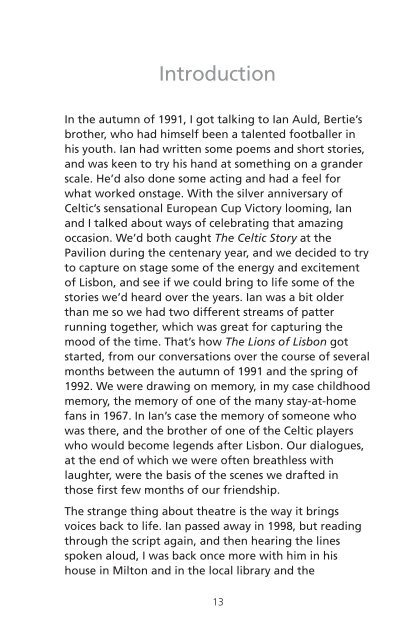The Lions of Lisbon by Ian Auld and Willy Maley sampler
On 25 May 1967, Celtic beat Inter Milan 2–1 to become the first British team to win the European Cup. Fifty years on, The Lions of Lisbon relives the jubilation from the fans’ point of view.
On 25 May 1967, Celtic beat Inter Milan 2–1 to become the first British team to win the European Cup. Fifty years on, The Lions of Lisbon relives the jubilation from the fans’ point of view.
Create successful ePaper yourself
Turn your PDF publications into a flip-book with our unique Google optimized e-Paper software.
Introduction<br />
In the autumn <strong>of</strong> 1991, I got talking to <strong>Ian</strong> <strong>Auld</strong>, Bertie’s<br />
brother, who had himself been a talented footballer in<br />
his youth. <strong>Ian</strong> had written some poems <strong>and</strong> short stories,<br />
<strong>and</strong> was keen to try his h<strong>and</strong> at something on a gr<strong>and</strong>er<br />
scale. He’d also done some acting <strong>and</strong> had a feel for<br />
what worked onstage. With the silver anniversary <strong>of</strong><br />
Celtic’s sensational European Cup Victory looming, <strong>Ian</strong><br />
<strong>and</strong> I talked about ways <strong>of</strong> celebrating that amazing<br />
occasion. We’d both caught <strong>The</strong> Celtic Story at the<br />
Pavilion during the centenary year, <strong>and</strong> we decided to try<br />
to capture on stage some <strong>of</strong> the energy <strong>and</strong> excitement<br />
<strong>of</strong> <strong>Lisbon</strong>, <strong>and</strong> see if we could bring to life some <strong>of</strong> the<br />
stories we’d heard over the years. <strong>Ian</strong> was a bit older<br />
than me so we had two different streams <strong>of</strong> patter<br />
running together, which was great for capturing the<br />
mood <strong>of</strong> the time. That’s how <strong>The</strong> <strong>Lions</strong> <strong>of</strong> <strong>Lisbon</strong> got<br />
started, from our conversations over the course <strong>of</strong> several<br />
months between the autumn <strong>of</strong> 1991 <strong>and</strong> the spring <strong>of</strong><br />
1992. We were drawing on memory, in my case childhood<br />
memory, the memory <strong>of</strong> one <strong>of</strong> the many stay-at-home<br />
fans in 1967. In <strong>Ian</strong>’s case the memory <strong>of</strong> someone who<br />
was there, <strong>and</strong> the brother <strong>of</strong> one <strong>of</strong> the Celtic players<br />
who would become legends after <strong>Lisbon</strong>. Our dialogues,<br />
at the end <strong>of</strong> which we were <strong>of</strong>ten breathless with<br />
laughter, were the basis <strong>of</strong> the scenes we drafted in<br />
those first few months <strong>of</strong> our friendship.<br />
<strong>The</strong> strange thing about theatre is the way it brings<br />
voices back to life. <strong>Ian</strong> passed away in 1998, but reading<br />
through the script again, <strong>and</strong> then hearing the lines<br />
spoken aloud, I was back once more with him in his<br />
house in Milton <strong>and</strong> in the local library <strong>and</strong> the<br />
13


















